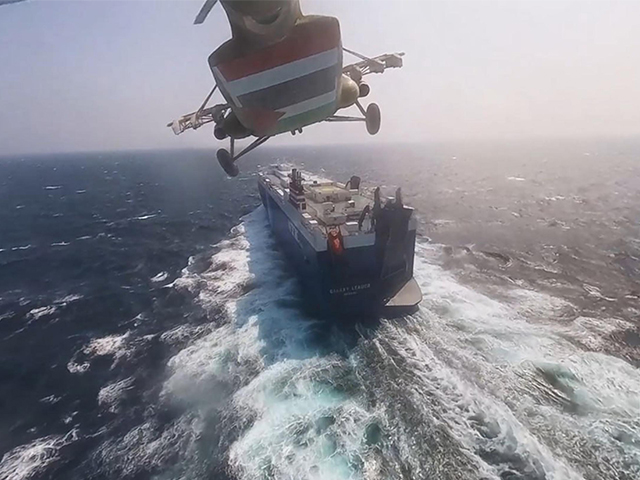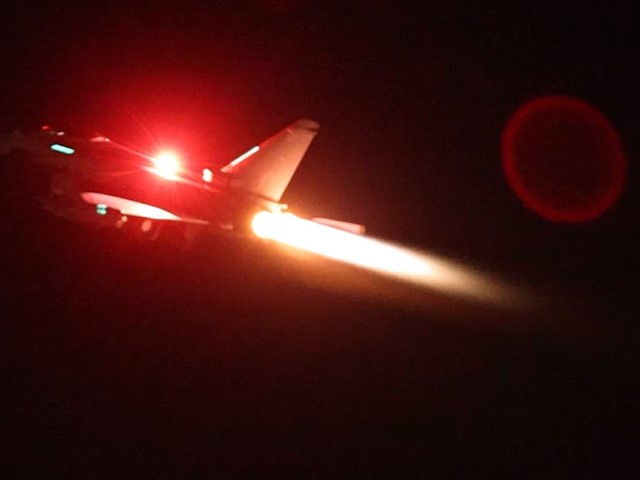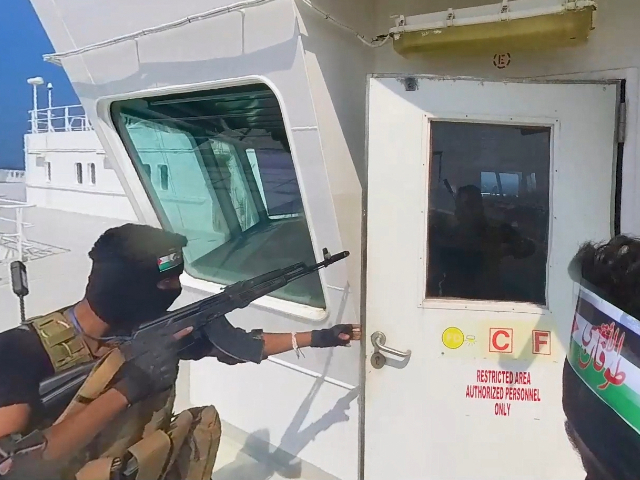The Financial Times reported on Wednesday that the Biden administration has asked top Chinese officials to pressure Iran to make its Houthi proxy terrorists in Yemen halt their attacks on Red Sea shipping.
According to the Times’s sources, these pleas from top Biden officials — all the way up to White House National Security Adviser Jake Sullivan and Secretary of State Antony Blinken — have fallen on deaf ears in Beijing.
The Biden team has reportedly been asking China for help for “the past three months” but saw “little evidence China had put any pressure on Iran to restrain the Houthis.”
The best Beijing could do was a bland statement asking all parties to guarantee the safety of Red Sea shipping. The Houthis responded by assuring China and Russia that ships flying their flags would not be attacked. Terrorist attacks on the vessels of other nations continued unabated.

Yemen’s Houthi fighters take over the Galaxy Leader Cargo in the Red Sea on November 20, 2023. (Houthi Movement via Getty Images)
Pinprick airstrikes by United States and United Kingdom forces against Houthi missile batteries have not convinced the terrorists to halt their attacks or significantly degraded their ability to threaten commercial vessels, so Biden officials are now talking to reporters on background about a significant escalation of military action against the Houthis.

A Royal Air Force (RAF) Typhoon aircraft takes off from RAF Akrotiri to join the U.S.-led coalition to conduct air strikes against Yemen’s Houthi rebels on January 11, 2024, in Akrotiri, Cyprus. (MoD Crown Copyright via Getty Images)
The Chinese have done little to help stabilize the Red Sea, instead focusing their criticism on the U.S. and Britain for “adding fuel to the fire” by using force against the Houthis. China also held the pro-Hamas, pro-Iran line by saying the only real solution to the Red Sea crisis would be Israel calling a ceasefire in Gaza, thus appeasing the Houthi terrorists. The Chinese also seem very reluctant to disrupt Iran’s fiction that it has no actual control over the Yemeni insurgency it has supported and armed for a decade.
Some observers of the conflict thought China might get more involved as the higher costs and longer shipping times imposed by the Houthi attacks began digging into the profit margins of Chinese exporters. Some of those export companies might struggle to survive without the fast service and low cost afforded by the Red Sea-Suez Canal trade route.

Houthi forces board the Galaxy Leader Cargo in the Red Sea on November 19, 2023. (Houthi Media Center via AP)
If those export companies have any political influence with the Chinese Communist Party, they do not appear to be using it yet. Biden officials who talked to the Times were glum about the prospects of China changing its stance.
“I wouldn’t want to overstate either how much they’ve done or what impact it has had,” one of the administration officials sighed.
Georgetown University’s Dennis Wilder, a former CIA expert on China, told the Times that Beijing values its diplomatic and commercial ties to Iran and other Middle Eastern powers far more than the money Chinese companies are losing in the Red Sea.
Wilder predicted China would be “very reluctant to use its limited influence with the Islamic state in a way that it perceives advanced U.S. interests without benefit to China.”
Suzanne Maloney of the Brookings Institution was even more pessimistic, suggesting the Chinese are savoring a “crisis that’s bogging the U.S. and its partners down” without causing massive disruptions to Chinese exports so far.
Chinese Foreign Ministry spokesman Wang Wenbin insisted on Wednesday that China has been in “close communication with various parties” and “worked actively to alleviate the tension in the Red Sea.”
“China calls for a stop of causing disturbance to civilian ships,” Wang said, but he immediately conditioned that call by claiming “tension in the Red Sea is a manifestation of the spillover of the Gaza conflict.”
“The priority now is to end the fighting in Gaza as soon as possible to avoid further escalation and prevent the situation from getting out of control,” he said.
Wang sniffed that since the U.S. Security Council has not “authorized the use of force by any country,” U.S. and British efforts to restrain the Houthis are a violation of “the sovereignty and territorial integrity of Yemen.”

COMMENTS
Please let us know if you're having issues with commenting.